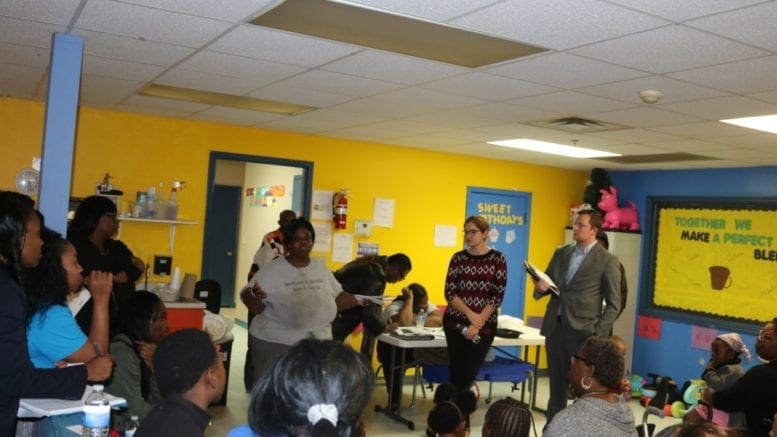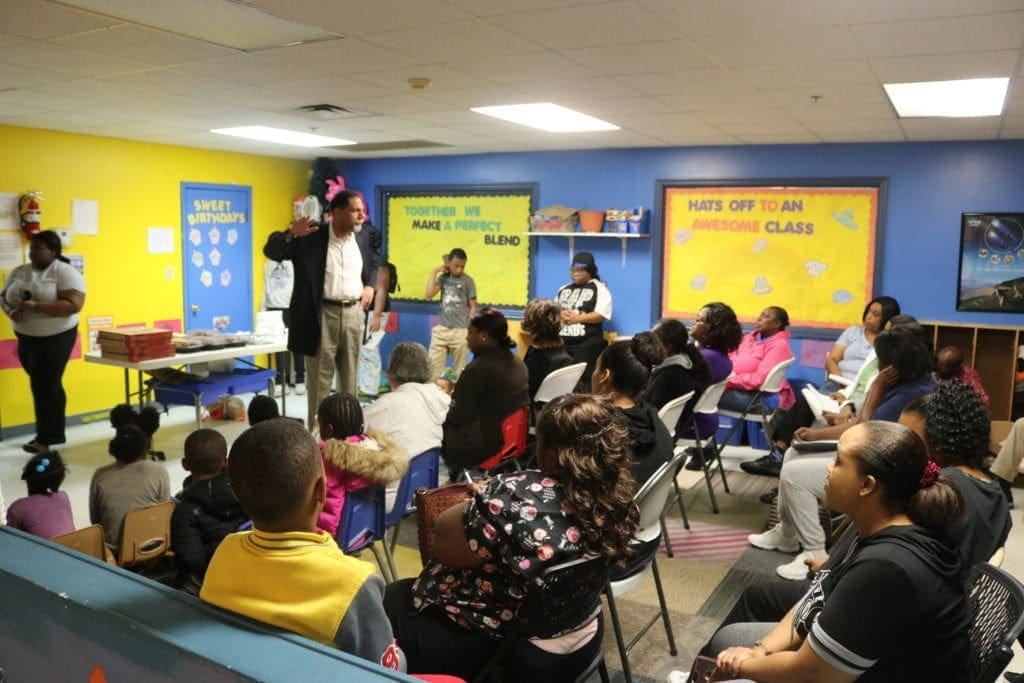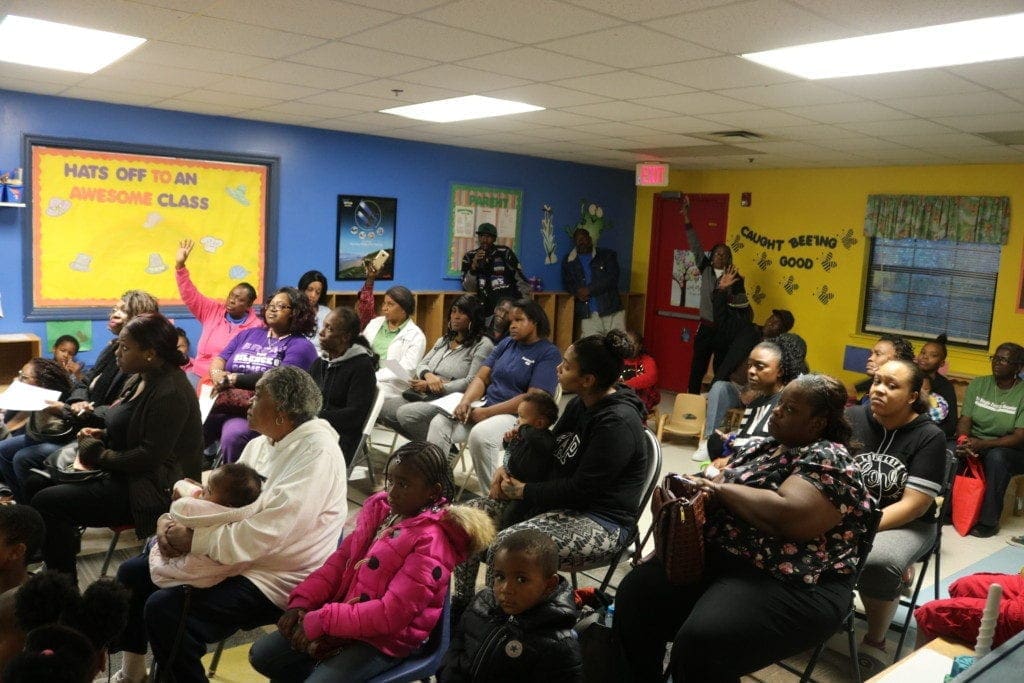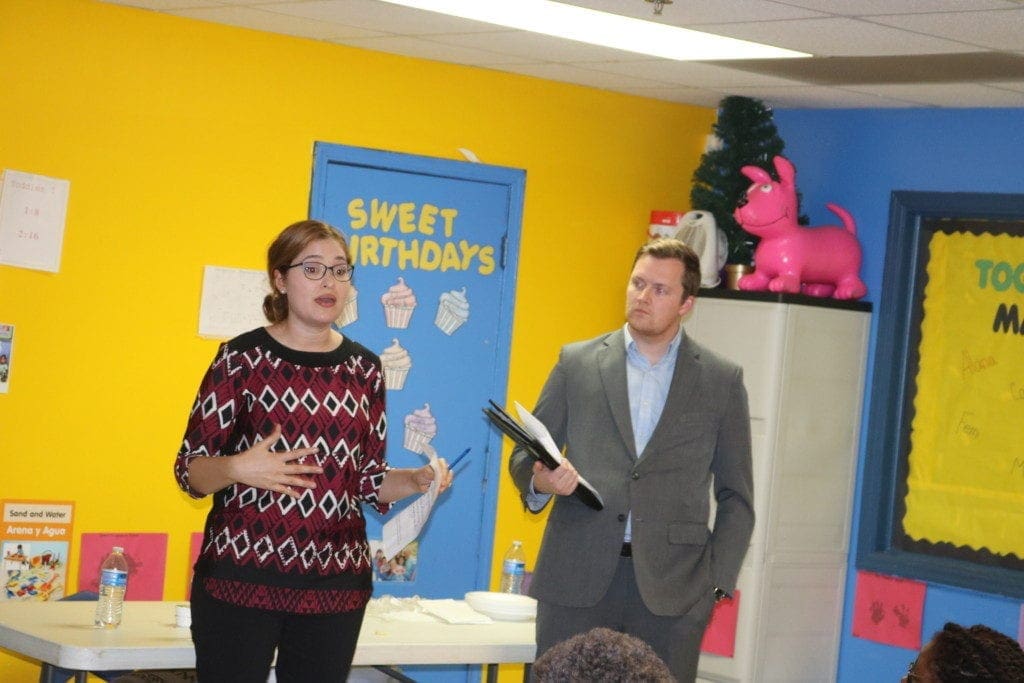Residents in three apartment complexes along Riverside Parkway complained of rats, water damage, mold, and malfunctioning heating and air units during a renters town hall meeting last Monday evening.
The We Thrive in Riverside Renters Association organized the meeting, and Monica Delancy, the organization’s executive director introduced speakers from county staff, the Cobb County Police Department’s Community Affairs Unit, and lawyers from Cobb Legal Aid. Cobb County District 4 Commissioner Lisa Cupid was on hand also.
Michael Murphy, the special assistant to Cobb commission chairman Michael Boyce, talked about the expectations renters should have. He said, “There’s a difference between reasonable profit and gouging. And what makes it so important, is even if you were paying $500 a month, if what you have is not livable, is not wholesome, it’s not worth it.”
He said there was a power imbalance between renters and landlords, and if you ask state legislators they would admit that the landlord has more power in the legislature. “And the reason is, that’s who writes the checks,” he said.
He advised residents to go to Board of Commissioners meetings, and “speak up and speak out.”
“But heretofore, the only person they hear from is Monica Delancy. So they think, well, you know, ‘here she comes again.’ She always has her facts, she always has her valid points. But folks, I know you know this … there’s power in numbers. You have a voice. You are somebody. As a citizen, you have the power, and you have the voice.”
A resident said neighbors in her complex tried to get code enforcement to act on problems at the apartments, and said “we have more problems with code enforcement than we do with (apartment) management.”
Murphy asked how many people in the audience knew the phone number of code enforcement. A number of hands shot up.
“I’m impressed,” Murphy said. “And did you all call?”
A resident of one of the complexes said she called code enforcement about leaks in the apartment, but they told her that since the leak wasn’t happening that day, there was nothing they could do about it.
“I’ll tell you how far I went, so you won’t think I’m illiterate about what I’m doing.” She described her efforts to get code enforcement to act on the conditions at her complex, and her frustration at the lack of movement from code enforcement.
Another resident said that one of the complexes whose property abuts her apartment building had overgrown grass, and as a result rats were living on the property. She said she had visited code enforcement, and left her letters and photographs of the conditions. “They didn’t do anything about it. So I’m not understanding why we got to live like that. I pay full rent. And I’m not paying full rent to live with no rodents.”
Another resident said code enforcement had directed her to the health department. She said, “But I can’t take off work every day just to go up there. I get off work at 5:30 in the afternoon, and they’re closed.”
Jennifer Yankulova and John Gainey, attorneys from Cobb County Legal Aid were on hand to speak and act as resources for residents. Gainey said Cobb Legal Aid provides a number of services to residents who qualify, and that one of those services was assistance with housing issues.
A resident asked if there were a way of putting money in escrow instead of submitting rent to the landlord if repairs are not being made.
“Unfortunately Georgia doesn’t have that type of system,” Yankulova said. “We’re going to talk about things you can do if your landlord’s not making repairs, and of course after that we can answer any questions that you guys have. We’re also going to talk a little bit about the Fair Housing Act and discrimination, because we are seeing that more and more frequently”
Yankulova said, “”I’ll tell you right off the bat, Georgia law is not the best. It’s not. It’s hard for tenants when your landlord’s not making repairs. But there are some things that you can do. The first is keep paying your rent. And I know that a lot of other states … have systems where you can put money into escrow, you can withhold rent, stop paying. Georgia does not allow that. So if you stop paying your rent because the landlord won’t fix something, that landlord then has the right to file an eviction. It doesn’t mean that at that point you’re completely out of options. But if your goal is to stay there, it’s not a good idea to stop paying rent.”
“Another thing is document what you see in writing. This is very, very, very important, because … when I have a hearing, having that documentation of ‘landlord, these are the problems I need fixed,’ is so helpful. Because as you can imagine, the landlords there, they claim they never knew it was a problem,” she said.
She said that copies of letters, emails, videos or photos were good as documentation. “If you have to go out and buy a space heater because the heat was broken, keep [the receipt]. “
Yankulova advised filing complaints with code enforcement as soon as possible, because of the time it takes to process complaints. “The sooner you get that in, the sooner it’s going to start.”
Cobb County Commissioner Lisa Cupid, who represents the district, said, “I used to work as a mediator in landlord/tenant in Fulton County, and I did talk to one of the judges here in Cobb. They don’t seem to be aware that there seem to be these continuing issues going on with these apartments. I’m not involved in the court system in Cobb.”
“I’m concerned that when people are getting evicted, they are not filing their counter-claim to let (the court) know what the issues are. And when I was in landlord and tenant court in Fulton County, if you did not file a counter-claim, basically they made you stand up, they said ‘fourteen days to move out’. A whole bunch of people moved en masse,” she said. “But, if you had a counter-claim, then you would have the opportunity to go to a mediator or talk before the judge. And I’ve seen instances where that judge would say, ‘Pay the court’ instead of paying the landlord.”
Gainey said that another course of action for a tenant with problems was small claims court. In addition to things in the lease agreements, under Georgia law landlords are responsible for making repairs even if that isn’t directly in the contract. He advised giving a call to Legal Aid before filing in small claims court.
Officer Conwell of the Cobb County Police Department Community Affairs Unit said the owners of three complexes had voluntarily entered into Cobb County’s nuisance abatement program. The program sets a schedule for landlords to correct certain problems, including security and maintenance issues. He said police have used the nuisance abatement program several times before, but this is the first time a landlord had entered into the program voluntarily. He said the extreme consequence of the landlord failing to do what they had agreed to would normally be that they would forfeit the property to the county.
“Because this is the first time we’ve ever had somebody volunteer to do this, there are some legal questions there with the consequences that we’ve got to get worked out. But we’re starting that process now.”
He said two weeks ago the owners were issued 87 citations across the three complexes. “Their court date was set sometime in December,” Conwell said.
A resident asked what happens to the money if the apartment owners are fined.
Conwell said the money goes to the county. “That’s kind of the Catch-22 of the system. We go out and issue the notice of violations. We want to issue those instead of citations, because if we issue citations we’re taking money away from the residents toward repairs and stuff. But if there’s no repairs going on, then obviously (the owners are) not putting the money towards (repairs), and they need a little more incentive than just a notification of violation.”
Monica Delancy said in an email to the Courier after the meeting that older apartment buildings are over-extended with repair requests, and when apartment complexes are sold, and management changes, the requests for maintenance are delayed.
“The majority of renters are paying over 40 to 50 percent (of their income) on rent and they do not receive any subsidies,” she wrote. “The truth of the matter is that people need a place to live with stagnant wages, choices are limited to older apartment complexes or apartments that have lax guidelines which have resulted in other issues that realistically … apartments can not keep up with and repair request are not enforced. We Thrive in Riverside Renters Association will continue to provide resources and encourage conversations with elected officials to address housing on all fronts.”



